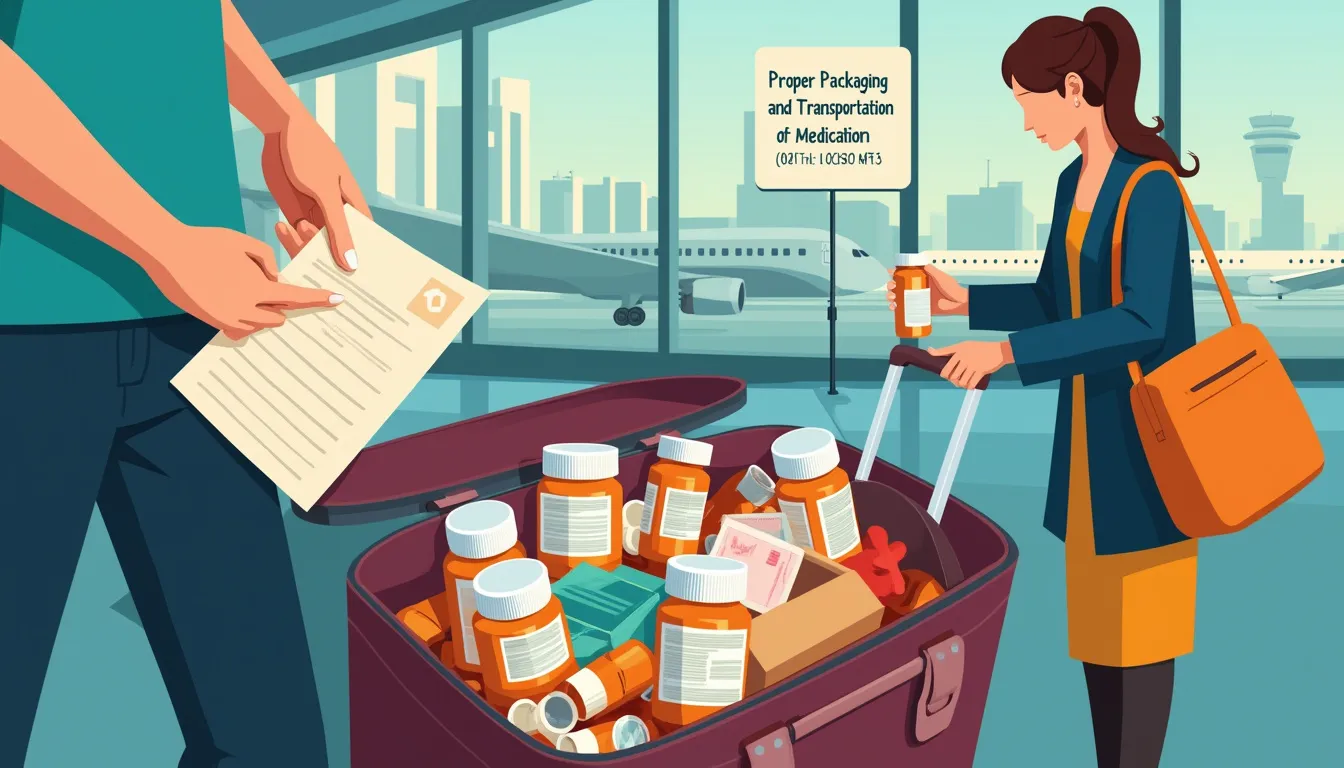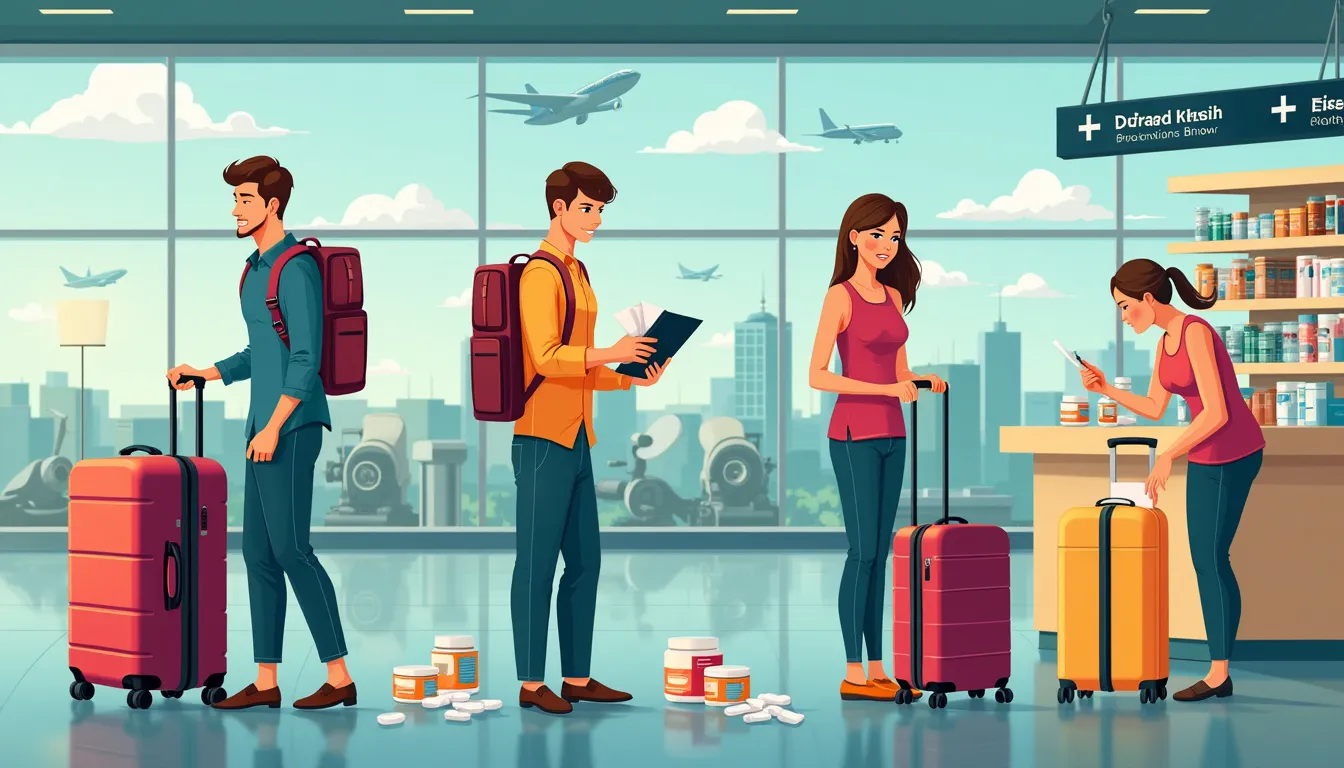Traveling internationally can be a thrilling adventure, but it comes with its challenges, especially if you are reliant on prescription medication. Ensuring you have the right medication handy and complying with international laws can seem daunting, but with proper preparation, it becomes manageable. This comprehensive guide provides essential tips for traveling internationally with prescription medication, helping you navigate regulations, packaging, and health considerations seamlessly. From researching international laws and obtaining necessary documentation to learning the best practices for packing and storing your medication, every detail plays a crucial role in a hassle-free journey. Moreover, understanding how to manage medication across different time zones and locating medical facilities abroad can make a significant difference in maintaining your health and safety. Whether you’re embarking on a business trip or a vacation, these essential tips will ensure that your medical needs are taken care of, allowing you to focus on enjoying your travels.
Understanding Regulations and Requirements for Travelling Internationally with Prescription Medication
Researching International Laws and Regulations
Embarking on a journey to a different country can be an enriching experience, but it requires thorough preparation, especially when it comes to travelling internationally with prescription medication. Each country has its own set of laws and regulations regarding the importation and possession of prescription drugs. These rules are designed to control the entry of controlled substances and to ensure public health and safety.
Before you travel, spend time researching the specific regulations of your destination country. Some nations have stricter controls than others and may place certain prescription medications on a restricted list or even ban them entirely. The embassy or consulate of the country you’re visiting is an excellent resource for obtaining the most accurate and updated information. Additionally, the International Narcotics Control Board (INCB) and the World Health Organization (WHO) provide guidelines and resources that can aid in your research.
Understanding the legal nuances of travelling internationally with prescription medication will help you avoid potential legal issues and ensure that your trip goes smoothly. It is invaluable to familiarize yourself with both the destination country’s regulations and any countries you may transit through to ensure compliance across all borders.
Obtaining Necessary Documentation
Documentation is a critical aspect of travelling internationally with prescription medication. Having the appropriate paperwork can expedite your journey through customs and security checks while adhering to the legal requirements of your destination country.
Start by obtaining a letter from your healthcare provider that details the list of medications you are carrying, their respective dosages, and the reasons for taking them. This letter should be on official letterhead, signed, and dated by your doctor. Furthermore, it’s advisable to have this letter translated into the language of the country you are visiting or a commonly understood language like French or Spanish.
Next, ensure you have a copy of your prescriptions. These should also be in their original packaging with the labels intact, as this helps verify their authenticity and your legitimate need for them. Some countries may also require an import permit for certain medications. Checking this in advance and obtaining the necessary permits will save you from potential confiscation of your medicine at the border.
In addition to your doctor’s letter and copies of your prescriptions, consider carrying a medical ID card or bracelet that indicates your need for specific medications, especially if you have a condition that could lead to emergencies, such as diabetes or epilepsy.
Ensuring Medication Authenticity and Labels
When travelling internationally with prescription medication, it’s vital to ensure that your medications are authentic and properly labelled. This not only eases the process at customs but also prevents any misunderstandings regarding the nature and necessity of your prescriptions.
Firstly, always carry medications in their original packaging with labels that clearly display your name, the name of the medication, the prescribing doctor, and the dosage instructions. This makes it easier for customs officials to verify that the medications are legally prescribed and intended for personal use. If the medication does not have a label, it could be mistaken for an illicit substance, leading to potential legal troubles.
It’s equally important to verify that the medication packaging is proper and undamaged. Damaged packaging can raise suspicions and lead to unnecessary complications. For blister packs or loose pills, use a pill organizer that allows you to transport your medications securely while ensuring labels can still be matched to the prescribed items.
Another key aspect to consider when ensuring medication authenticity is to avoid buying medication from non-reputable sources, either before departing or while you’re abroad. Counterfeit medications can be ineffective or dangerous and can cause legal issues if found in your possession.
In summary, understanding the regulations and requirements for travelling internationally with prescription medication starts with thorough research, proper documentation, and ensuring your medications have authentic labels and packaging. These steps are crucial to ensuring that your travel experience is both enjoyable and compliant with international laws.

Proper Packaging and Transportation When Travelling Internationally with Prescription Medication
Ensuring that your prescription medication is properly packaged and transported when travelling internationally is crucial for both convenience and safety. Adhering to best practices will not only help you avoid potential issues at customs but will also ensure that your medication remains intact and effective throughout your journey.
Best Practices for Packing Medications
The first step in preparing for your trip involves careful planning and packing of your prescription medications. Here are some key tips to follow:
- Use Original Packaging: Always keep your medications in their original containers with their labels intact. This can help avoid any confusion or suspicion at border controls, where officials may scrutinize your medications.
- Separation of Medications: If you have multiple types of medication, consider keeping different medications in separate containers. This can help with organization and ensuring that everything is easy to access.
- Secure Packaging: Use zip-lock bags or hard-case containers to protect your medications from spills, crushing, or contamination. Additionally, using clear bags can ease the inspection process at airports.
- Double Check Quantities: Pack more medication than you would typically need for your trip duration, keeping in mind possible delays or unexpected extensions of your stay. This ensures that you don’t run out of essential medication.
Storing Medication During Travel
During your journey, storing your medications properly is essential to maintain their efficacy and integrity. Here’s how to do it:
- Temperature Considerations: Some medications are temperature sensitive. Make sure you know the storage requirements of your prescriptions. Use insulated bags or cool packs if necessary to keep your medication at the appropriate temperature.
- Easy Access: Keep your medications in your carry-on luggage rather than checked baggage. This ensures you have quick access to your medication when needed and protects against the risk of lost luggage.
- Keep a Healthcare Kit: Along with your medications, carry a small health care kit that includes basics like cotton swabs, alcohol wipes, hand sanitizer, and over-the-counter medications to address minor health issues that may arise during travel.
Carrying a Doctor’s Note or Prescription List
Documentation is an integral part of travelling internationally with prescription medication. To avoid any hassles with airport security or customs officials, be prepared with the appropriate paperwork:
- Doctor’s Note: A letter from your healthcare provider detailing your medical condition and the prescribed medication can be invaluable. Ensure it includes your doctor’s contact information and clearly states the necessity of the medication for your health.
- Prescription List: Carry a copy of your prescription list that includes the generic names of your medications, dosages, and frequency of use. This can be particularly helpful if you need to obtain a refill or replacement abroad.
- Language Translation: If travelling to a non-English speaking country, consider having your prescription and doctor’s note translated into the local language. This eases communication with local healthcare providers and officials.
Proper packing, storage, and documentation are essential measures to ensure that your trip goes smoothly when travelling internationally with prescription medication. By following these best practices, you can focus on enjoying your journey without worrying about your medical needs.

Health and Safety Considerations While Travelling Internationally with Prescription Medication
When travelling internationally with prescription medication, it’s crucial to consider various health and safety aspects to ensure a seamless and worry-free journey. International travel can pose several challenges, especially for those who rely on regular medication. Proper precautions and preparation can help mitigate these challenges and ensure that your health needs are met effectively while abroad.
Managing Medication in Different Time Zones
One of the significant hurdles when travelling internationally with prescription medication is managing your medication schedule across time zones. Different time zones can disrupt your routine and may affect the timing of your medication doses. To maintain a consistent regimen, here are some tips:
- Consult with Your Healthcare Provider: Before your journey, discuss your travel itinerary with your doctor. They can provide specific instructions on how to adjust your medication schedule to align with your new time zone.
- Use a Pill Organizer: A pill organizer can help you keep track of your doses, especially when crossing multiple time zones. It allows you to organize your medications by day and time, reducing the risk of missed doses.
- Set Alarms: Utilize alarms or reminders on your smartphone or watch. This can ensure you take your medication at the correct times, regardless of the time zone differences.
- Gradual Adjustment: If your travel involves a significant time difference, consider gradually adjusting your medication schedule a few days before your departure. This can help your body acclimate to the new routine more smoothly.
Addressing Potential Medical Emergencies
Traveling with a chronic health condition or prescription medication means being prepared for potential medical emergencies. Below are some key steps to follow:
- Carry an Emergency Kit: Always have an emergency kit containing extra medication, a list of your prescriptions, any necessary medical devices, and basic first aid supplies. This kit can be a lifesaver in case of lost luggage or unexpected delays.
- Medical Identification: Wear a medical ID bracelet or carry a card in your wallet that details your medical condition, allergies, medications, and emergency contact information. This information can be crucial for healthcare professionals in case of an emergency.
- Emergency Contacts: Have local emergency hotline numbers and the contact information for medical facilities at your destination. Keep this information handy in case you need urgent medical assistance.
- Travel Insurance: Consider purchasing travel insurance that covers medical emergencies and evacuation. This can provide peace of mind knowing that you’re covered if an unforeseen health issue arises.
Locating Pharmacies and Medical Facilities Abroad
Finding pharmacies and medical facilities in a foreign country can be daunting but is essential when you’re travelling internationally with prescription medication. Here are some ways to locate these facilities:
- Research Before You Go: Before departure, research the availability of pharmacies and medical facilities near your destination. Knowing where to find them in advance can save you time and stress during your trip.
- Ask for Recommendations: If you’re staying at a hotel, the concierge or reception staff can often provide recommendations for nearby pharmacies and medical facilities. Additionally, local expatriate communities or online forums can be valuable resources for this information.
- Language Barriers: Language can be a barrier when seeking medical assistance abroad. Learn basic phrases related to your medical needs in the local language or carry a translation app. This can help you communicate effectively with pharmacy staff and healthcare providers.
- Online Tools: Utilize online tools and mobile apps to locate nearby pharmacies and medical facilities. Many of these platforms provide user reviews and ratings, helping you choose reliable and trustworthy establishments.
- Local Health Services: Inquire about local health services and organizations that can assist you in finding medication and medical help. Some countries have specific services catering to travellers and expatriates, offering information and assistance in multiple languages.
Paying attention to health and safety considerations is essential when travelling internationally with prescription medication. By managing your medication schedule across different time zones, preparing for potential medical emergencies, and knowing how to locate pharmacies and medical facilities abroad, you can safeguard your health and make your trip a pleasant experience. Taking these steps ensures that your primary focus remains on enjoying your travel adventures.
Travelling internationally with prescription medication requires thorough preparation and knowledge to ensure a smooth and trouble-free journey. Understanding the various regulations and requirements in different countries is paramount. Travelers should begin by researching and familiarizing themselves with international laws regarding the transport and possession of prescription drugs. This includes confirming the necessity of documentation such as prescriptions, doctor’s notes, and possibly official translations. Authenticity and proper labeling of medications are essential to avoid misunderstandings and potential legal issues.
Proper packaging and transportation of medications are vital to maintaining their efficacy and accessibility during travel. Best practices include keeping medications in their original containers, clearly labeled with the traveller’s name and dosage instructions. It is advisable to pack medications in carry-on luggage to prevent loss and ensure they remain in a climate-controlled environment. Additionally, carrying a comprehensive prescription list or a doctor’s note can facilitate conversations with customs officials or local healthcare providers.
Health and safety considerations are crucial for travelers managing prescription medications across different time zones. Preparing a plan for adjusting dosage schedules can help maintain the effectiveness of the medication and mitigate health risks. Understanding how to handle potential medical emergencies is critical, as well as having knowledge of local pharmacies and medical facilities to access additional support if necessary.
In conclusion, thorough preparation and informed planning are key when travelling internationally with prescription medications. By understanding regulations, ensuring proper packaging, and considering health and safety, travelers can navigate their journeys with confidence and peace of mind. These essential tips help ensure that one’s medical needs are effectively managed, allowing for a safer and more enjoyable international travel experience.







